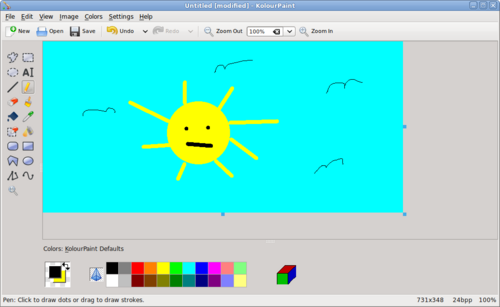Purpose of Kolourpaint4
Kolourpaint is a simple Graphic editor (similar to MS Paint)...
Kolourpaint is similar to MS Paint (as opposed to gpaint) and is recommended it for simple graphical creating and editing... The main use of GIMP is for image retouching and editing, but is difficult to create simple images (eg. drawing a box, etc)...
The Kolourpaint4 application has the following features:
- Select tools
- Choose foreground, background colour
- Draw line (various line widths, shift drag works same as in MS Paint)
- Brush
- Draw (Pencil)
- Colour Fill (bucket)
- Eraser
- Colour Eraser
- Text
- Rectangle (also rounded rectangle)
- Polygon
- Ellipse
- Connected Line
- Curve
YouTube Video
- If you want to see the visual steps to "Grabbing Student Work", here is a link to a customized YouTube video: http://www.youtube.com/watch?v=QNrU4gTWEo0
Written Instructions
- Below are the written instructions (in case you prefer to have a printout of these procedures):
Using KolourPaint Application
Launching KolourPaint
To be completed...
Elements of KolourPaint Application
To be completed ...
Becoming Familiar with Tools
To be completed ...
Drawing with KolourPaint
Draw line (various line widths, shift drag works same as in MS Paint)
To be completed ...
Brush
To be completed ...
Draw (Pencil)
To be completed ...
Colour Fill (bucket)
To be completed ...
Eraser
To be completed ...
Colour Eraser
To be completed ...
Adding Text
To be completed ...
Rectangle (also rounded rectangle)
To be completed ...
Polygon
To be completed ...
Ellipse
To be completed ...
Connected Line
To be completed ...
Curve
To be completed ...
Additional Resources
Documentation
Kolourpaint Handbood: http://docs.kde.org/stable/en/kdegraphics/kolourpaint/index.html
Online Tutorials
Kolourpaint4 Tutorials (YouTube):
- Interesting Features of Kolourpaint: [ http://www.youtube.com/watch?v=pCMhnivjWoQ ]
- How to Draw a Pear: [ http://www.youtube.com/watch?v=2giJyyGCBJs ]
- Reduce Picture Size: [ http://www.youtube.com/watch?v=Um_6tYOLYhQ ]
